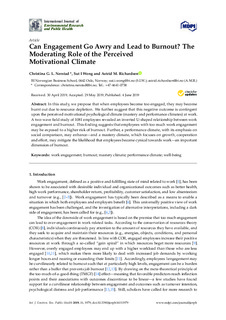| dc.contributor.author | Nerstad, Christina G. L. | |
| dc.contributor.author | Wong, Sut I | |
| dc.contributor.author | Richardsen, Astrid Marie | |
| dc.date.accessioned | 2019-12-19T13:25:58Z | |
| dc.date.available | 2019-12-19T13:25:58Z | |
| dc.date.created | 2019-06-09T01:11:39Z | |
| dc.date.issued | 2019 | |
| dc.identifier.citation | International Journal of Environmental Research and Public Health. 2019, 16 (11), 1-21. | |
| dc.identifier.issn | 1660-4601 | |
| dc.identifier.uri | http://hdl.handle.net/11250/2634171 | |
| dc.description.abstract | In this study, we propose that when employees become too engaged, they may become burnt out due to resource depletion. We further suggest that this negative outcome is contingent upon the perceived motivational psychological climate (mastery and performance climates) at work. A two-wave field study of 1081 employees revealed an inverted U-shaped relationship between work engagement and burnout. This finding suggests that employees with too much work engagement may be exposed to a higher risk of burnout. Further, a performance climate, with its emphasis on social comparison, may enhance—and a mastery climate, which focuses on growth, cooperation and effort, may mitigate the likelihood that employees become cynical towards work—an important dimension of burnout. | |
| dc.language.iso | eng | |
| dc.title | Can engagement go awry and lead to burnout? The moderating role of the perceived motivational climate | |
| dc.type | Peer reviewed | |
| dc.type | Journal article | |
| dc.description.version | publishedVersion | |
| dc.source.pagenumber | 1-21 | |
| dc.source.volume | 16 | |
| dc.source.journal | International Journal of Environmental Research and Public Health | |
| dc.source.issue | 11 | |
| dc.identifier.doi | 10.3390/ijerph16111979 | |
| dc.identifier.cristin | 1703629 | |
| cristin.unitcode | 158,4,0,0 | |
| cristin.unitcode | 158,9,0,0 | |
| cristin.unitname | Institutt for ledelse og organisasjon | |
| cristin.unitname | Institutt for kommunikasjon og kultur | |
| cristin.ispublished | true | |
| cristin.fulltext | original | |
| cristin.qualitycode | 1 | |
